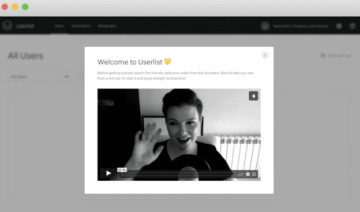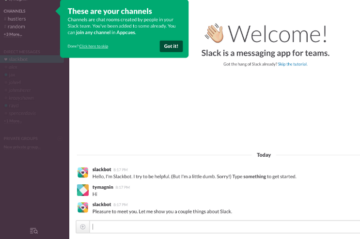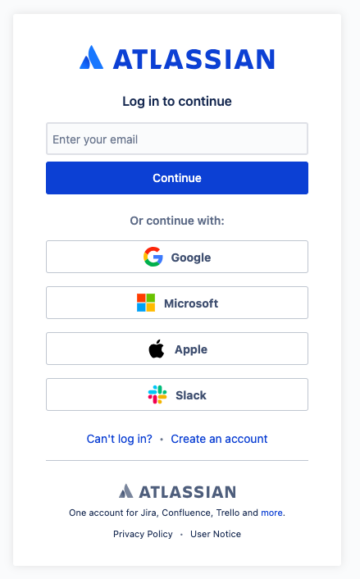Find out who’s popping champagne and who’s rummaging for Aspirin
In the ever-evolving realm of search engine optimization (SEO), Google’s March 2024 core update has sent shockwaves through the digital landscape. The update has left many content marketers scrambling to adapt lest they find themselves adrift in the vast expanse of the internet.
Several website owners and SEO analysts have reported fluctuations in traffic following Google’s latest core update. For example, MozCast’s Google algorithm weather report shows increased volatility in search results, indicating changes in ranking and visibility for many websites.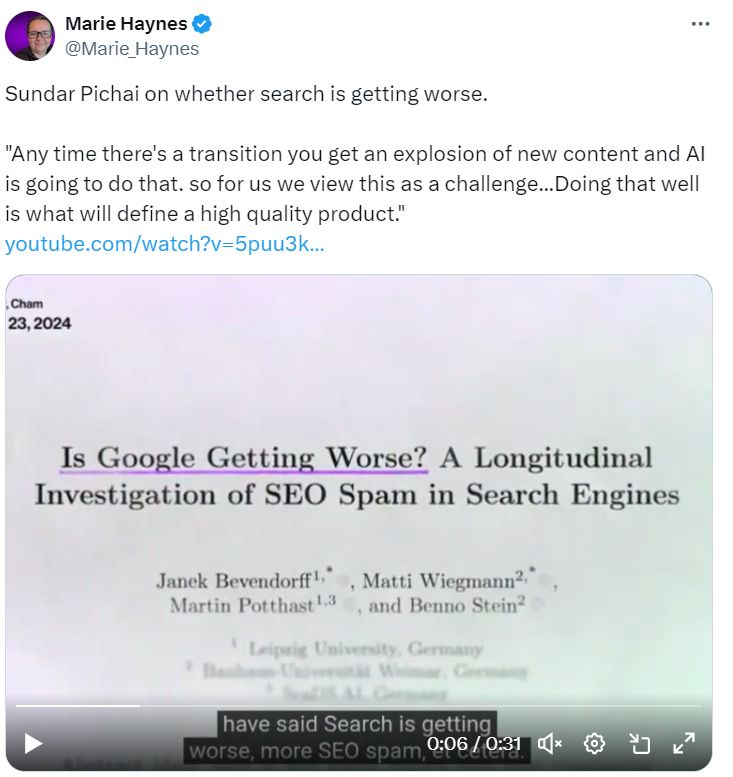
The update, which commenced its rollout in March is more than just a mere tremor in the force. It’s a full-fledged offensive against low-quality content, spammy practices, and manipulation tactics that have long plagued search engine results pages (SERPs). Google has made it clear that the days of exploiting loopholes and gaming the system are over.
Is it for real? Time has to answer.
The March 2024 Core Update
The update has three main components:
(Find the google spam policies here)
- Scaled Content Abuse: Google is taking action against websites that mass-produce content solely for the purpose of improving their search rankings. This goes beyond just spammy auto-generated content to any type of content created at large scales without focusing on quality. Thanks to the advent of ChatGpt and many of its distant cousins 🙂
- Site Reputation Abuse: Site Reputation Abuse (The Parasite SEO Purge): In a move that has sent shockwaves through the ranks of affiliate marketers and content syndicators, Google has declared war on the practice of piggy-backing on the reputation of high-authority websites. Publishing content on high-authority sites like Forbes, Reddit, or LinkedIn to try and benefit from the site’s reputation in search rankings is no longer allowed. Google now considers this a spammy tactic unless it’s clearly marked as sponsored or advertorial content.
- Expired Domain Abuse: Purchasing an expired domain that had good rankings and repurposing it with low-quality content is now considered a violation. A practice that was once a favored tactic of the SEO underworld is not allowed any more…sigh! Google believes using an expired domain for a new website can mislead users into thinking the new content is associated with the previous site that owned the domain. The key lesson for businesses is that when it comes to branding or rebranding, they can no longer simply acquire an expired domain based on their perceived reputation. Therefore, before migrating to a new domain, it is crucial for businesses to thoroughly evaluate the previous website’s content and its standing with Google to ensure proper alignment with their own business focus and goals. Failing to do so could result in penalties under Google’s new guidelines.
So now, Who’s popping the champagne?
Looks like Google is in complete contention with the user-generated content (UGC) giants like Reddit, Quora and LinkedIn. Most of these sites are continuing their streak of victory since last year.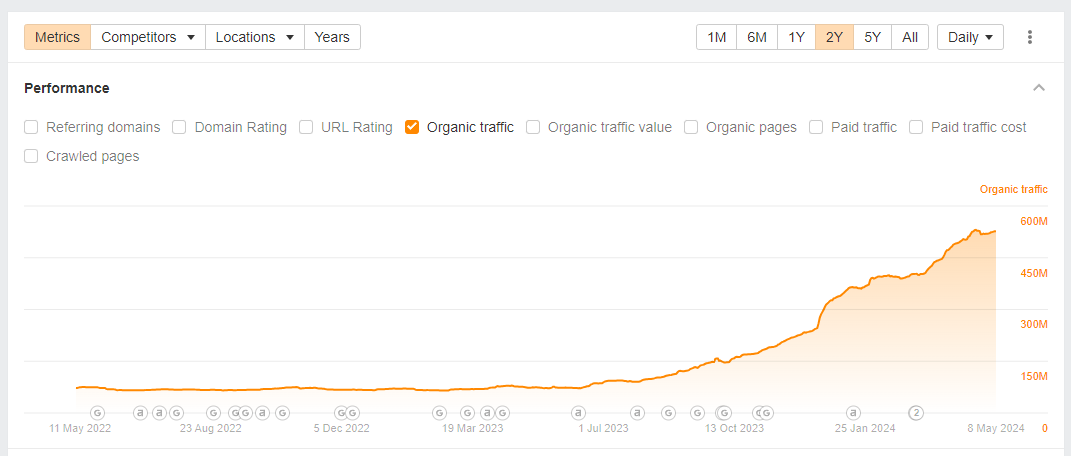
But hold on, it’s not just the text-based UGC platforms having a party. Visual UGC platforms like TikTok, Instagram, and Pinterest have also snagged a bigger slice of the organic search visibility pie.
A year full of cleanup and updated policies – this is what it has gotten us to. Here’s a search result of how to get rid of cockroaches. Eat them… bruh seriously🤯
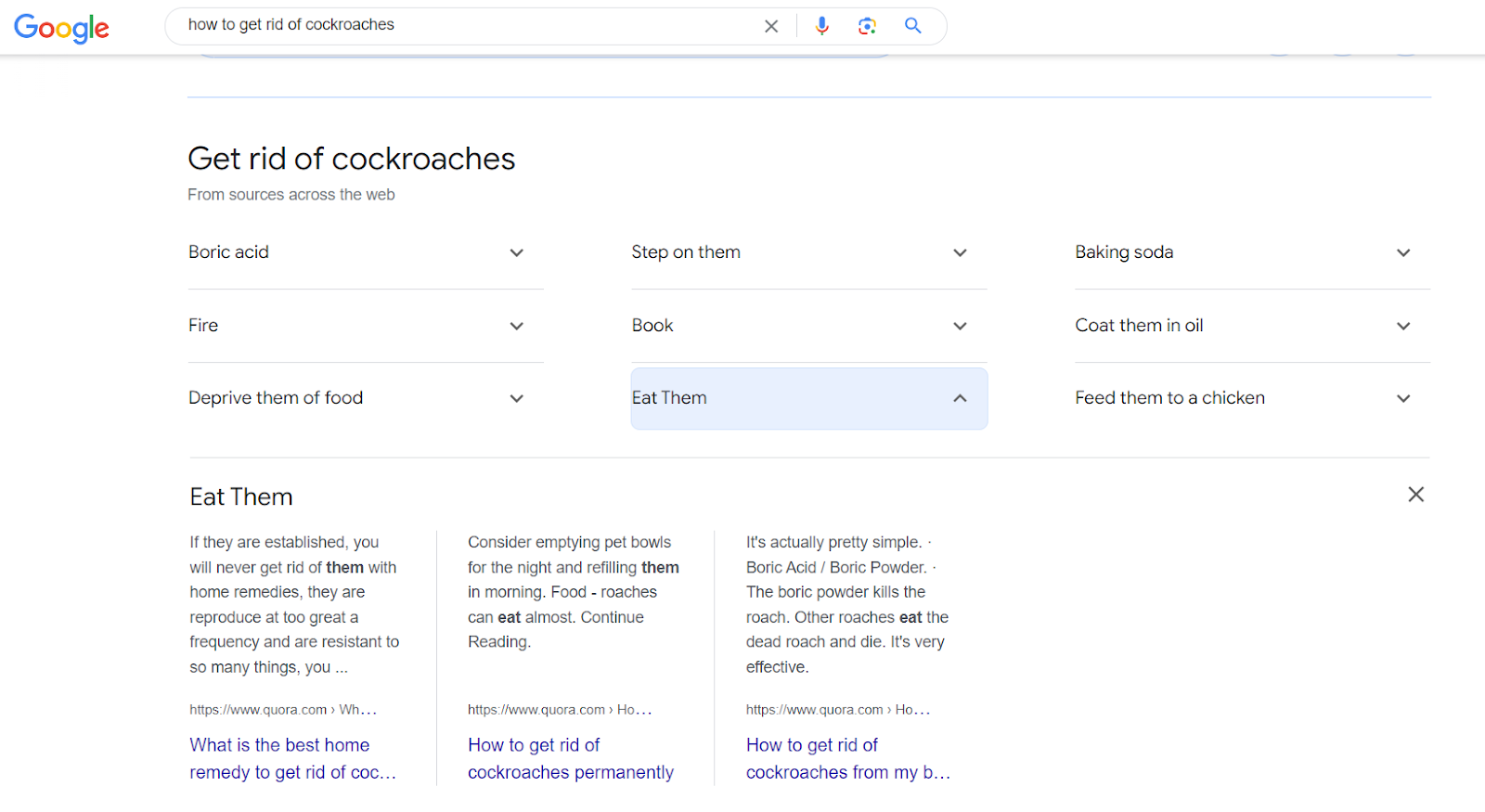
And the poor Aspirin Holders
Coming to our aspirin holders, independent publishers and review sites that got hit hard by last year’s Helpful Content Update are still feeling the sting. Sites like Housefresh, Retro Dodo, and Mountain Weekly News are waving their affiliate links sadly as they watch their search visibility shrink. But wait, there’s more.
Even big review sites and retailers aren’t immune to Google’s whims. The Wirecutter and Business Insider took a hit with their search visibility. And speaking of retailers, it seems like Google isn’t giving the middlemen a share in the pie. Superstar retail names like Walmart, Best Buy, and Macy’s saw only marginal positive shifts, if any.
Let’s take a peek at some search queries and the rollercoaster of rankings:
- “Snowboarding”: REI took a tumble, while Burton and SkiCanada soared.
- “Camping Equipment”: REI and Walmart slipped, but CampingWorld pitched a tent at the top.
- “Waterproof running shoes”: REI got wet, FleetFeet stayed dry, and Nike joined the race.
- “Best Gaming Laptops’ ‘: Best Buy lost points, Gamesradar leveled up.
- “Best Laptops for College”: Toms Guide got a failing grade, Lenovo aced it.
- “Best Running Shoes for Women”: Vogue jogged to the back, Outdoor Gear Lab sprinted ahead.
- “Home Security Systems”: The NY Times Wirecutter felt unsafe, Ring and Cnet beefed up security.
Source: [SEOFOMO by Aleyda Solis]
I am not against big brands ranking. But, is bigger always better? Don’t we need perspectives?
What does the latest Google update mean to the SaaS world?
One of the most significant shifts observed in Google’s latest update is the emphasis on turning search results into a product marketplace. The examples of Nike and Lenovo ranking higher suggest that Google may be prioritizing transactional pages and bottom-of-the-funnel content for certain queries.
However, it’s still too early to definitively say whether this signals a larger trend for SaaS websites to start seeing more prominence for their product/pricing pages in search results. As of now, it’s only fluctuations after fluctuations that accompany any core algorithm update.
If you are a SaaS founder, marketer, or SEO specialist, don’t panic. Focus on the fundamentals.
- Conduct a thorough content audit. Pay close attention to any AI-generated materials. Ensure all content provides real value to the end user.
- Examine your backlink profile and disavow or remove any links coming from sites that were deindexed as part of this update.
- Prioritize the overall user experience of your website. Optimize content structure, navigation, and on-page elements to facilitate easy information discovery for visitors.
This entire Google saga is taking me back to the 2000s. Oh boy, how far have we come? Two decades later, the tables are shifting again. Whether it’s a short-term disruption or a seismic shift in how search space (not just Google) is going to evolve. Only time will tell. Until then, focus on your core best practices and continue to create user-centric content pieces.
- SEO Powered Content & PR Distribution. Get Amplified Today.
- PlatoData.Network Vertical Generative Ai. Empower Yourself. Access Here.
- PlatoAiStream. Web3 Intelligence. Knowledge Amplified. Access Here.
- PlatoESG. Carbon, CleanTech, Energy, Environment, Solar, Waste Management. Access Here.
- PlatoHealth. Biotech and Clinical Trials Intelligence. Access Here.
- Source: https://www.inturact.com/blog/google-2024-core-update
- :has
- :is
- :not
- $UP
- 1
- 2000s
- 2024
- 8
- a
- abuse
- accompany
- acquire
- Action
- adapt
- advent
- Affiliate
- After
- again
- against
- ahead
- algorithm
- alignment
- All
- allowed
- also
- always
- am
- an
- Analysts
- and
- answer
- any
- ARE
- aren
- AS
- associated
- At
- attention
- audit
- back
- based
- BE
- before
- believes
- benefit
- BEST
- Best Buy
- best practices
- Better
- Beyond
- Big
- bigger
- brand
- branding
- brands
- business
- businesses
- but
- buy
- by
- camping
- CAN
- certain
- Champagne
- Changes
- ChatGPT
- clear
- clearly
- Close
- CNET
- code
- College
- come
- comes
- coming
- commenced
- complete
- components
- considered
- considers
- content
- continue
- continuing
- Core
- could
- create
- created
- crucial
- decades
- declared
- digital
- discovery
- Disruption
- Distant
- do
- DODO
- does
- domain
- Dont
- dry
- Early
- easy
- eat
- elements
- emphasis
- end
- Engine
- ensure
- Entire
- equipment
- Ether (ETH)
- evaluate
- evolve
- example
- examples
- experience
- exploiting
- facilitate
- failing
- far
- favored
- feeling
- felt
- Find
- fluctuations
- Focus
- focusing
- following
- For
- Forbes
- Force
- founder
- from
- full
- full-fledged
- Fundamentals
- gaming
- Gear
- get
- giants
- Giving
- Goals
- Goes
- going
- good
- got
- grade
- guide
- guidelines
- had
- Hard
- Have
- having
- helpful
- here
- higher
- Hit
- hold
- holders
- Home
- Home Security
- How
- How To
- http
- HTTPS
- HubSpot
- ie
- if
- immune
- improving
- in
- increased
- independent
- indicating
- information
- Insider
- Internet
- into
- IT
- ITS
- joined
- just
- Key
- lab
- landscape
- laptops
- large
- larger
- Last
- Last Year
- later
- latest
- left
- Lenovo
- lesson
- like
- links
- Long
- longer
- loopholes
- lost
- Macy's
- made
- Main
- Manipulation
- many
- March
- March 2024
- marginal
- marked
- marketers
- marketplace
- materials
- May..
- me
- mean
- mere
- Middle
- middlemen
- migrating
- more
- most
- Mountain
- move
- names
- Navigation
- Need
- New
- news
- NIKE
- no
- now
- NY
- observed
- of
- offensive
- oh
- on
- once
- only
- optimization
- Optimize
- or
- organic
- our
- out
- Outdoor
- overall
- own
- owned
- owners
- pages
- Panic
- part
- party
- Pay
- penalties
- perceived
- perspectives
- pieces
- pitched
- plagued
- Platforms
- plato
- Plato Data Intelligence
- PlatoData
- points
- policies
- poor
- popping
- positive
- practice
- practices
- previous
- prioritizing
- Product
- Profile
- prominence
- proper
- provides
- publishers
- Publishing
- purpose
- quality
- queries
- quora
- Race
- Ranking
- ranks
- real
- real value
- realm
- rebranding
- remove
- Reported
- reputation
- result
- Results
- retail
- retailers
- Retro
- review
- Rid
- Ring
- rollercoaster
- rollout
- running
- s
- SaaS
- sadly
- saga
- saw
- say
- scales
- Search
- search engine
- search engine optimization
- security
- security systems
- seeing
- seems
- seismic
- sent
- seo
- serps
- Share
- shift
- SHIFTING
- Shifts
- shockwaves
- short-term
- Shows
- signals
- significant
- simply
- since
- site
- Sites
- Slice
- So
- soared
- solely
- some
- Space
- spam
- speaking
- specialist
- Sponsored
- standing
- start
- stayed
- Still
- structure
- suggest
- Superstar
- system
- Systems
- T
- tactics
- Take
- taking
- tell
- tent
- than
- thanks
- that
- The
- their
- Them
- themselves
- then
- therefore
- These
- they
- Thinking
- this
- thorough
- thoroughly
- three
- Through
- tiktok
- time
- times
- to
- too
- took
- top
- traffic
- transactional
- Trend
- try
- Turning
- two
- type
- ugc
- under
- unless
- unsafe
- until
- Update
- updated
- us
- User
- User Experience
- user-centric
- users
- using
- value
- Vast
- victory
- VIOLATION
- visibility
- visitors
- visual
- vogue
- Volatility
- wait
- Walmart
- war
- was
- Watch
- we
- Weather
- Website
- websites
- weekly
- welcome
- were
- What
- when
- whether
- which
- while
- WHO
- will
- with
- without
- Women
- world
- year
- you
- Your
- zephyrnet



